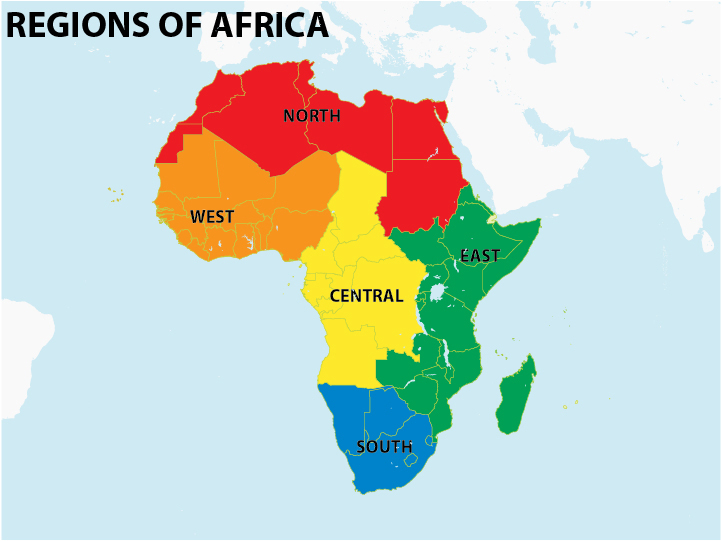
Africa is one of the seven continents that make up the world. Africa is the second-largest continent and has the second-largest human population in the world. The world’s largest continent in terms of both size and population is Asia.
Africa is made up of 54 different countries that are categorized into five regions: Northern Africa, Western Africa, Central Africa, Eastern Africa, and Southern Africa. Each country is unique and has its own customs, traditions, and languages (more than a thousand different languages are spoken in Africa).
Africa has many different climate zones. It is the hottest continent on the planet because more than half of the continent consists of dry lands and desert. The Sahara Desert, which spans across the northern portion of the continent, is the largest hot desert in the world. A desert is defined as a region that gets very little to no rainfall each year, so a region doesn’t need to have a hot climate to be considered a desert. The largest deserts in the world—Antarctica and the Artic—are actually cold deserts.
Africa is known for its incredible wildlife as well as for many of its landforms. Africa’s most famous wildlife lives mostly in the savannah region, but can be found anywhere south of the Sahara Desert. Famous animals of the African Savannah include lions, elephants, giraffes, rhinos, hippos, hyenas, and zebras.
Some of Africa’s best-known landforms include the Nile River, Lake Victoria, Victoria Falls, Mount Kilimonjaro, and the rainforests of the Congo River basin. The Nile River is the longest river in the world. Unlike any other river, the waters of the Nile run from south to north (usually rivers run from north to south).
A little over 100 years ago, finding the source of the Nile River was a big deal. Several European explorers braved the jungles of Africa in order to be the first to discover it. John Hanning Speke from England was the first to discover the Nile’s source in 1858. But he was apparently such a showoff about it that no one believed him for quite some time. Years later—after Speke was long dead—Lake Victoria was proven to be the true source of the Nile.
Lake Victoria is the largest lake in Africa and spreads across three countries: Uganda, Kenya, and Tanzania. Dangerous animals like Nile crocodile and hippos live in Lake Victoria and its surrounding wetlands.
Victoria Falls is the largest waterfall in the world. It is nowhere near Lake Victoria, however. Instead, the falls cross the border between Zambia and Zimbabwe.
Mt. Kilimonjaro is the highest mountain peak in Africa, rising more than 16,000 feet above sea level. Mt. Kilimonjaro, a dormant volcano, is topped with three volcanic cones that are covered with snow for most of the year. It is part of Kilimanjaro National Park in Tanzania and is a popular destination for rock climbers from all over the world.
Africa’s rainforests are mostly located in Central Africa, and the rainforests in the Congo River basin are the largest in Africa. As you can guess, the Congo River basin is mostly located in the Congo. The rainforests of the Congo River basin are home to half of Africa’s wildlife, the most notable being gorillas and chimpanzees.
From apes to zebras and from Algeria to Zambia, Africa has a lot to offer. It has magnificent landforms, incredible wildlife, and is rich with different people and diverse cultures. As you can see, Africa is worth more than just a glance; to find out more about Africa, search for more information online or in your library.



 About BeeLine
About BeeLine